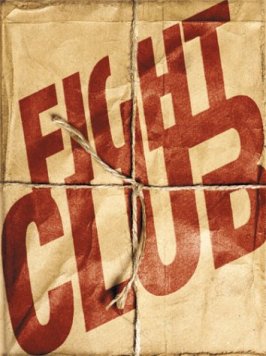Fight Club review by Jackass Tom
High-pulse
In the year 1999, there were a rash of films that used middle class corporate life as its punching bag. American Beauty, the Oscar winner of the year, showed Kevin Spacey as a man fed up with his life, the way his family treats him, and his job. So he quits. Office Space is about a man who is tired with the repetitive nature of his job. So he stops going. But no film in 1999 openly attacks excessive capitalism like Fight Club.
Like the other two movies, the film is about a character (who remains nameless and can be referred to as “the Narrator”) that has grown sick of his job. It is destroying his life, and his mind as he falls deeper and deeper into insomnia. David Fincher directs this dreamlike film that opens with the Narrator (Edward Norton) giving us his depressingly, cynical view on the life he chosen (“Life insurance pays off triple if you die on a business flight.”) He goes to support groups for illnesses he doesn’t even have in order to feel any sort of emotion that he wouldn’t normally have.
His life soon changes when he meets Tyler Durden (Brad Pitt). Tyler not only reinforces the Narrator’s ideas, but also brings them to a new level and even takes action on them. The Narrator begins to notice that Tyler does not fall inline with most social constructs. He squats in a rundown house in a bad neighborhood. He has half a dozen jobs that he uses just to keep a steady flow of income, but they also afford him other luxuries, like splice bits of porno films subliminally into a children’s film. Soon, the Narrator himself learns that he is not only capable of living outside of his former monetary dependencies but he is also happier and more independent. The things he had bought no longer “own him.”
Together they form an underground organization called Fight Club. It’s a release for men who feel like they are wasting their life. Through fighting they feel pain and a rush of adrenaline. To them it is the only way to know they are ‘alive’ (very similar to the rush of emotions Edward Norton’s character felt at the support groups). At Tyler’s commands, Fight Club builds into something bigger: Project Mayhem. Tyler’s anarchist views are realized through Project Mayhem when he molds Fight Club participants into radical revolutionaries. Questions over how far Tyler will go, and how much he can be trusted take a mysterious twist when the narrator finds that Tyler is in fact his own alter ego. A personality our friendly narrator created, out of necessity in order to create what he subconsciously viewed as his ‘ideal life’.
Now it has gotten to the point where plots with ‘twists’ had become clichéd. Possibly due to the popularity of David Mammett’s con-artist films and the Oscar winning Usual Suspects, screenwriters have been looking for tricks to pull within the last 20 minutes of a film to make the audience rethink what they saw in the previous 90 minutes. In some cases, this is enjoyable but it many cases it is forced, if not telegraphed and often compromises any integrity of the film may have had. But for some reason, this twist seems to work (although the physical possibilities of a man picking a fight with himself takes a bit of convincing). Because of the psychology involved, and the dreamy cinematography, certain impossibilities like this can be over-looked.
You could argue that men in Fight Club are reckless and violent, and for that reason the film is careless. The participants in Project mayhem are an anarchist group who consistently put people in danger through acts of public destruction. Some have claimed that the director of Fight Club showed a lack of responsibility by glorifying the violence and anarchy. But it is not without purpose. Corporations are represented with a total lack of humanity. Working within them removes the life out of its workers (the Narrator being the case in point). The narrator’s job is even more unique in that he judges whether saving lives down the road is worth the cost of a recall. The drones within Project Mayhem aren’t much different removing names from their members and therefore removing human features (“You are NOT a beautiful snowflake”, “In Project Mayhem we have no names.”). When the participants of project mayhem drag in the dying body of Bob Paulson (Meatloaf with “bitch-tits.”), they saw him as casualty of war; upper management would probably treat him the same way during a layoff period.
Is Fight Club “Un-American” and expressing strong Socialist views? At face value it might appear look like the Russian Revolution (sometime in the 1910s). The destruction of capitalism is quite blatant and in light of last years events this movie may seem like a slap in the face (which makes it that much harder to faithfully review). But movies like this are important as well as entertaining. They provide politics that are contrary to the average “I love America” with a fake smile garbage that comes out of Hollywood. In times like these, I realize the necessity to support your country but that doesn’t mean that it is still beyond criticism.
For an interesting theory on fight club go here









9 out of 10 Jackasses blog comments powered by Disqus
Search
Fight Club

IMDB Link: Fight Club
DVD Aspect Ratio: 2.40:1
DVD Extras: Tons of commentaries, behind the scenes, deleted scenes, music video, text interview with Norton, and more